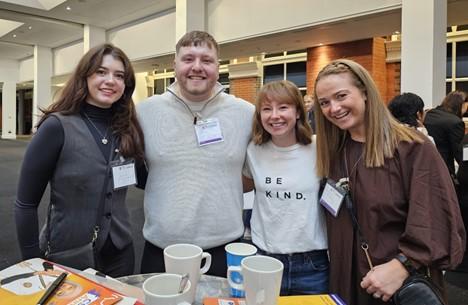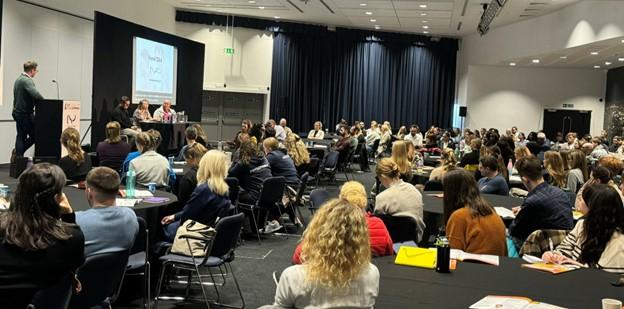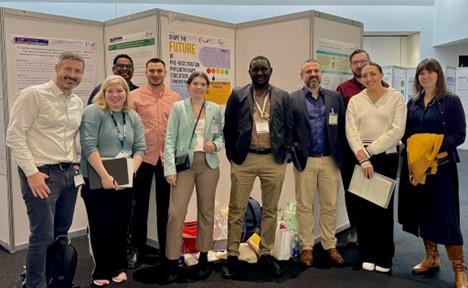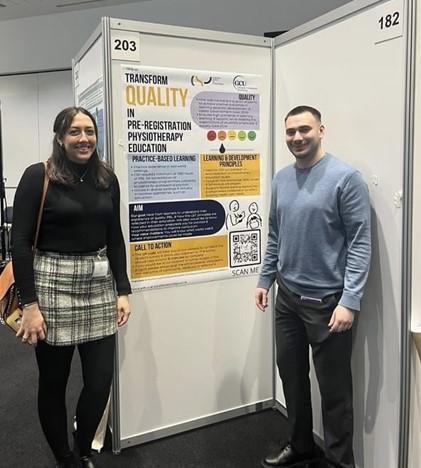Scottish students were out in force at the #Physio24 conference and come together to share their experiences and how they’re championing the future of the profession through the Transforming Quality in Pre-Registration Physiotherapy Education research project.

Queen Margaret University student, Hannah McAuley
The student conference kicked off day one of #Physio24 with keynote speaker Professor Lisa Roberts emphasising the importance of effective communication, urging students to listen to their patients without interruption as research shows that physiotherapists are seven times more likely to interrupt than a patientis.
Former chair of CSP council, Ishmael Beckford, discussed the importance of skills gained during leadership practice-based learning and the opportunities available for students at this early stage of their careers. Four students from across the country presented abstracts on their research including the need to make physiotherapy more inclusive for adults with ADHD and student placements within the justice sector which expanded students’ knowledge of the breadth of the physiotherapy profession and the exciting myriad of opportunities available.

With seven rooms hosting presentations and networking sessions over days two and three, of the conference, Hannah found Neil Langridge's 'Reflecting on rehabilitation workshop particularly engaging. It sparked conversation about 'upstreaming' rehabilitation instead of working reactively, questioning whether physiotherapists are in fact, the right people for the rehab job.
Afterwards, Hannah caught up with Sarah Bamford, MSK adolescent specialist physiotherapist, who made the crucial point that active, healthy children are more likely to become active, healthy adults and that this is where the focus should lie.

‘I'm incredibly grateful to have met so many influential people and for the insight the conference gave me into the broad spectrum of specialties in this wonderful world of physiotherapy,' said Hannah.
'From leadership to lecturing to research and even equine rehab. The opportunities are endless.’
Discovering the future of the profession
At the CSP Conference, Glasgow Caledonian University student Caitlin Lee experienced first-hand the breadth and energy of the physiotherapy profession. Thanks to funding from the Scottish CSP Board, the doctorate in physiotherapy student embarked on what would prove to be an enlightening journey.

The conference opened with an inspiring presentation from environmental physiotherapist Joost van Wijchen, who challenged attendees to consider physiotherapy's role in planetary health. ‘His message reminded me that our responsibilities extend beyond individual patient care,' reflects Caitlin, who found herself contemplating her future environmental impact as a practitioner.
An evening session on environmental physiotherapy provided Caitlin with valuable insights into student representation opportunities and board involvement. These discussions opened her eyes to the various ways she could shape the profession's future. Dr Gillian Campbell's presentation on pelvic floor issues in high level female athletes particularly captured Caitlin's attention. The revelation that many women hesitate to report these symptoms sparked important discussions about creating more open dialogue around women's health in physiotherapy.
Throughout the conference, there were plenty of networking opportunities. A memorable conversation with performing arts physiotherapist Bill Taylor offered valuable career guidance, particularly regarding the integration of women's health into physiotherapy practice. These interactions reinforced Caitlin's passion for her chosen field.
The conference experience extended beyond educational sessions. The exhibition centre buzzed with cutting-edge innovations, from BoneFinder radiography to zero-gravity treadmills. The CSP dinner proved a highlight, where Caitlin enjoyed conversations with key figures including CSP CEO John Cowman, amid an atmosphere of celebration and community.
‘I am incredibly grateful for the Scottish CSP Board's support in making this opportunity possible,’ says Caitlin. As she returns to her studies, she carries with her not just new knowledge, but a renewed enthusiasm for the learning journey ahead in physiotherapy.
Future of physiotherapy education championed
Doctorate in physiotherapy (pre-registration) students, Tamsin Fitzgerald and Chris Duncan from Glasgow Caledonian University, attended the CSP student and annual conference as members of the CSP’s ‘Transforming Quality in Pre-Registration Physiotherapy Education’ project team. The initiative seeks to gather recommendations from voices across the profession on enhancing physiotherapy education to meet the evolving demands of healthcare.

Tamsin and Chris engaged with conference attendees, such as students, university staff, physiotherapists in practice, and physiotherapy leadership across the three days. The students collect insights on the current state of physiotherapy education and areas for improvement. ‘Our questions explored various aspects of quality in physiotherapy education,’ Chris explained.
We discussed the essential skills needed for graduates, how placements can better facilitate learning, what the 1,000 hours of practice-based learning should involve, and the future roles of digital technology and remote healthcare.
Opinions varied on the quality of teaching needed for the future, with some highlighting the importance of practical skills, emphasising how simulation and practical demonstrations could enhance student abilities to provide person-centered care. Stakeholders widely acknowledged the need for adequate placement opportunities that reflect the diversity of the profession.

‘My favourite conversations centered around placements and how they can be made more supportive for students,’ Tamsin shared.
‘The variability in responses, along with my own placement experiences, highlighted the need for high-quality, standardised placements across the UK to produce a higher standard of physiotherapists.’ She added, ‘We thoroughly enjoyed discussing how we can better facilitate the development of soft skills like communication and leadership. These skills are fundamental to be an effective physiotherapist and are invaluable in providing person-centred care’.
The experience provided valuable insights and reinforced the importance of stakeholder engagement in shaping the future of physiotherapy education. ‘We would like to thank project lead Shiv Shanmugam, research fellow Laura Blackburn, and everyone who took the time to speak with us,’ they said. ‘Your engagement and interest in the project are greatly appreciated.’
Physiotherapists who did not attend the conference can still contribute to the project and help shape the future of physiotherapy education by participating
Number of subscribers: 1